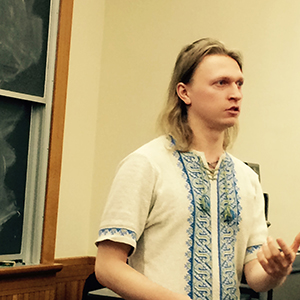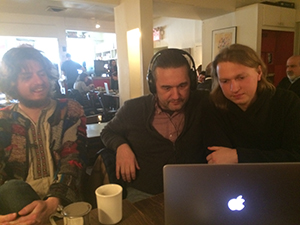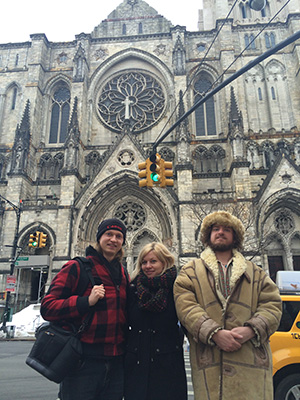 |
|||||||
|
|||||||||||||||
The Ukrainian Film Club at Columbia University held an event with Fedir Aleksandrovych and Artem Ryzhykov, two Ukrainian crew members of the feature documentary "The Russian Woodpecker", dir. Chad Gracia, US-UK-Ukraine coproduction, which has just been awarded the Grand Jury Prize in the World Cinema Documentary category at the hugely prestigious Sundance Film Festival and is headed for theatrical release and distribution in the U.S. in the near future. Mr. Aleksandrovych conceived the idea of the film and appear as the narrator in it. Mr. Ryzhykov is its cinematographer. In their most recent discussion of the critically-acclaimed The Russian Woodpecker, filmmaker Fedir Aleksandrovich and cinematographer Artem Ryzhykov wholeheartedly presented the backstory to their impassioned art, becoming one step closer to cementing their selves with their work forever as their audience grows bigger. Their presence was anything but pretentious, nor was it projected in controlled tempos of self-promotion. Both are young, and placidly believe that their "version of what happened" will remain a mere version until the international community pursues an objective investigation. In addition, they are almost finished with their first feature-length narrative film, "Serpent's Pride," a Lithuanian-Ukrainian co-production. Artem has more than 15 short films in his repertoire and is currently an active volunteer in the Poltava Battalion of Those Who Care, supporting the Ukrainian Army back home. He was injured on the Maidan, his camera took his bullets for him. He still cannot bring himself to talk about what goes on in the battlefield. Fedir descends from an ancient Kyiv family, which, in more modern history, has produced many notable artists. Art is his natural way of life and thought, and he is somewhat of a contemporary prophet. When questioned about his so-called theatrics and dynamic behavior, (on-screen as much as in life), he does not bat an eye to say, "theater is the most serious thing in the world…it is our connection to the dead," simultaneously evoking Oscar Wilde and Ancient Greek drama, and further positing that, "those who have perished during the Holodomor and the Chornobyl disaster want to tell the truth."
In the months leading up to the EuroMaidan Revolution, which saw the ouster of Russian-backed president Viktor Yanukovych , Fedir happened upon the steely carcass of a Soviet over-the-horizon (OTH) radar system within the Chornobyl Exclusion Zone , called Chornobyl 2 (a.k.a Duga or Arc). He was working on a particularly surrealist project, and traveled to Chornobyl, envisioning that one of these vaguely familiar installations would make a good monster. Instead, he saw the Iron Curtain, and soon started to proclaim, "the undead Soviet ghoul is pushing us toward World War III." This towering metallic mesh is relatively well-documented: it was a Soviet Antiballistic Missile early-detection network during the Cold War, and now it stands defunct, orphaned by history. Surely enough, the enigmatic construction and its lesser counterparts also once had a distinctive noise to animate their overall monstrosity. The Duga would emit an acute, relentless tapping signal that, in Fedir's words, "beat like the Soviet Union's very heart in the past," and, in Western international broadcasting lingo of that selfsame not-too-distant past, was recognized as the regular interference the "Russian Woodpecker." These characteristic frequencies were measurably disruptive for amateur and commercial communications, but dissipated in rough conjunction with the Chornobyl Disaster, and definitively, the Cold War as we had known it. In any case, the Duga radar system was singularly powerful in and with the past. However, unexpected discoveries experienced by Fedir and Artem paint a fantastically different picture.
Unsettled by the uncanny proximity between disaster site and Chornobyl 2, Fedir launched an investigation that eventually unearthed a plethora of dark and haunted facts suggesting that Chornobyl-2 was part of a monumental failure by a top-line individual, tasked with a secret government project. Fedir confirmed, at least for himself and for Artem, that the greatest Duga edifice never actually became operative. In the aforementioned bureaucrat's mind, the project was irrevocably lost (with a leviathan price of two decades and 8 million rubles- twice the value of the nuclear power plant itself). The filmmakers conclude: the accident at Reactor 4 was an orchestrated cover-up. During this incredible time, Fedir rubbed shoulders with former Soviet officials, some of whom plainly rationalized that he had access to classified or cached documentation-- all but confirming his own beliefs and strengthening theory plausibility. Nevertheless, he faced threats to his life, feared for his family, endured terrible bouts of self-denial (coming close to recanting his theory), and briefly fled the country. Artem faithfully filmed these ordeals as they transpired, and their documentary evolved under the direction of Chad Garcia, just as the uprising in Kyiv was beginning to peak and intersect with their hunt for a mastermind. In light of all that has happened throughout their journey, Fedir, Artem, and their colleagues see beyond the voided Chornobyl-2. In their eyes, the eldritch Russian Woodpecker is alive and well and growing fast, situated in a real-life 'heart of darkness' that continues to expand, in novel ways. The skeletal Woodpecker is fleshing out through propaganda and soaring with the myopic, programmed hatred of Russians towards their equally bewildered Ukrainian "brothers." But it is indiscriminately blossoming on all of their blood pooled together, just the same. Khrystyna Tsuniak,
On YouTube
|
|||||||||||||||


